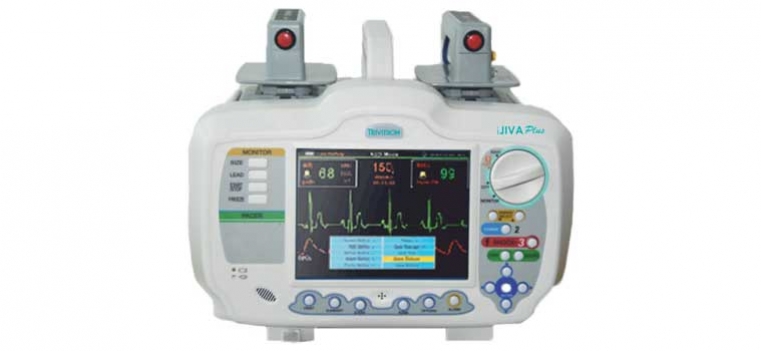
Biphasic Defibrillator Price: Understanding the Cost and Value of Life-Saving Technology
- Oct 28, 2024
- | 8
In the critical world of healthcare, the efficiency and quality of medical equipment play a central role in saving lives. One essential device in emergency care is the biphasic defibrillator. Designed to restore a normal heart rhythm during cardiac arrest, biphasic defibrillators offer a life-saving solution for patients experiencing irregular heartbeats or sudden cardiac arrest (SCA). For hospitals, clinics, and healthcare providers considering investing in this essential technology, understanding the biphasic defibrillator price and the value it brings to medical settings is crucial.
In this article, we’ll explore the factors that affect the biphasic defibrillator price, the benefits of using biphasic technology over traditional monophasic defibrillators, and how healthcare providers can optimize their investment in this critical medical tool.
What is a Biphasic Defibrillator?
A biphasic defibrillator is a device used to deliver an electrical shock to the heart to restore its normal rhythm. Unlike monophasic defibrillators, which deliver a single, unidirectional pulse, biphasic defibrillators use two phases in their waveform. This bidirectional pulse allows a more efficient distribution of energy, which reduces the required shock level to achieve a successful defibrillation.
Biphasic defibrillators are commonly used for:
- Treating patients with atrial fibrillation and ventricular fibrillation
- Emergency care in hospitals, ambulances, and clinics
- High-stress environments like intensive care units (ICUs) and emergency rooms
The price of biphasic defibrillators can vary depending on factors such as the technology used, additional features, brand, and country of purchase.
Factors Affecting the Biphasic Defibrillator Price
Several factors contribute to the overall cost of biphasic defibrillators. Understanding these elements can help healthcare providers make informed purchasing decisions and find a device that fits both their budget and clinical needs.
- Type of Defibrillator
Biphasic defibrillators come in various forms, including automated external defibrillators (AEDs), manual defibrillators, and advanced models with additional monitoring features. Basic AEDs, often used in public places, are typically more affordable than manual and advanced defibrillators used in hospital settings. The device's complexity and design directly impact the biphasic defibrillator price. - Technology and Features
The presence of advanced features—such as ECG monitoring, CPR guidance, voice prompts, and data recording—adds value but also increases the device's cost. Advanced biphasic defibrillators with high-tech integrations are priced higher than standard models, but they offer critical tools that may be essential in specific healthcare environments. - Brand and Manufacturer
Reputable brands in the medical device industry often command higher prices due to their reliability, warranty options, and customer support. When considering the biphasic defibrillator price, it’s important to assess the manufacturer’s reputation and the quality of the product to ensure that you’re investing in a dependable device. - Geographic Location
The country of purchase and local import policies can also influence the final price. Defibrillators purchased in regions with higher tariffs, taxes, or shipping costs may come with a steeper price tag. Additionally, exchange rates play a role when purchasing equipment from international brands. - Maintenance and Service Contracts
Investing in a biphasic defibrillator also means considering long-term costs, such as maintenance and servicing. Some manufacturers offer service contracts, which may be added to the initial purchase price but can provide significant savings on repairs and upgrades in the future.
Why Biphasic Defibrillators are Worth the Investment
Biphasic defibrillators are known for their efficiency and ability to provide effective defibrillation at lower energy levels compared to monophasic defibrillators. Lower energy levels reduce the potential for damage to the heart and surrounding tissues, which is particularly beneficial in repeated shock scenarios.
Key Advantages of Biphasic Defibrillators:
- Increased Success Rates: Studies have shown that biphasic defibrillators have higher success rates in restoring a normal heart rhythm compared to monophasic devices, particularly on the first shock.
- Reduced Risk of Injury: Lower energy shocks mean less potential for burns and tissue damage, creating a safer experience for patients.
- Cost-Efficiency in Long-Term Use: While biphasic defibrillators might be more expensive initially, their long-term efficiency and higher success rates make them cost-effective, especially in facilities where they are used frequently.
Choosing the Right Biphasic Defibrillator for Your Facility
Selecting the appropriate defibrillator is essential for ensuring the best possible outcomes for patients while also managing costs. Here are some key considerations for healthcare providers when choosing a biphasic defibrillator:
- Patient Demographics
Consider the types of patients and conditions most commonly treated at your facility. Some biphasic defibrillators are optimized for adults, while others come with pediatric settings. Choose a device that caters to your patient population. - Environment of Use
Whether you need defibrillators for ambulances, intensive care units, or general emergency rooms, each environment may require different features. For instance, portable AEDs are ideal for ambulances, whereas advanced monitoring capabilities may be necessary for critical care units. - Budget Constraints
While it’s tempting to opt for high-end models with all the latest features, budget constraints are always a factor. Setting a clear budget based on your facility’s needs will help you balance quality and affordability in selecting the right biphasic defibrillator. - Future Service Needs
Ensure that the device you choose has readily available servicing options, either through the manufacturer or certified third-party vendors. A reliable service plan will keep the device functioning at peak performance, reducing downtime and costly repairs.
Purchasing Tips: Getting the Best Value for the Biphasic Defibrillator Price
To make the most out of your investment in a biphasic defibrillator, here are some purchasing tips:
- Compare Multiple Quotes: Getting quotes from several suppliers helps ensure competitive pricing and may open up opportunities for discounts or additional services.
- Consider Refurbished Models: For facilities on a tighter budget, refurbished biphasic defibrillators can provide the necessary technology at a fraction of the cost. Ensure that the refurbished units are certified and come with warranties.
- Ask About Training and Support: A defibrillator is only effective if healthcare providers are trained to use it. Many suppliers offer training as part of the package, which can be a valuable asset, especially for facilities introducing biphasic defibrillators for the first time.
- Evaluate Warranty Options: Given that biphasic defibrillators are long-term investments, warranties can protect your purchase and offer peace of mind. Look for comprehensive warranties that cover parts, labor, and software updates.
Final Thoughts: Investing in Quality with Trivitron’s Biphasic Defibrillators
At Trivitron, we understand that investing in life-saving medical equipment is a decision that requires careful consideration. Our biphasic defibrillators are engineered to meet the highest standards, ensuring reliable performance and longevity in demanding healthcare environments. Our models are equipped with advanced features designed to improve the effectiveness of resuscitation efforts while remaining user-friendly for healthcare providers.
By choosing Trivitron’s range of biphasic defibrillators, healthcare facilities benefit from superior technology and the assurance of high-quality support, training, and maintenance services. Our commitment to providing cost-effective solutions allows healthcare providers to enhance patient care without compromising on quality.
For more information on biphasic defibrillator prices and our range of offerings, please contact Trivitron today. Let us help you find the right defibrillator to support your facility's life-saving efforts.




